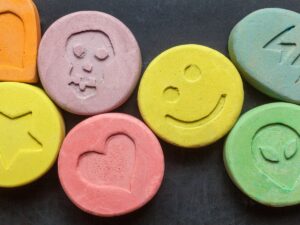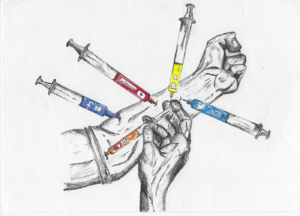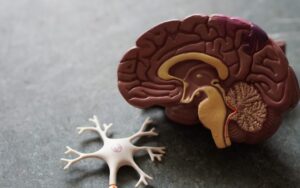Addiction to alcohol and drugs can have devastating effects on a person’s physical, mental, and emotional well-being. Breaking free from the chains of addiction is a challenging journey, but one of the crucial steps toward recovery is the detoxification process.
We will explore all aspects of alcohol and drug detox, shedding light on the detoxification process, its significance, types of detox services, and the potential benefits it offers. Whether you or someone you know is struggling with addiction, understanding the detoxification process can pave the way for a healthier and addiction-free life.
What is Alcohol and Drug Detox?
Alcohol and drug detox is the process of removing alcohol and drugs from the body. It is the first step in the treatment of addiction. Talking about detoxification is the initial phase of substance abuse treatment, where the primary focus is eliminating all traces of alcohol or drugs from the body.
This process involves managing withdrawal symptoms while ensuring the patient’s safety and well-being. Detoxification is usually supervised by medical professionals in a controlled environment to provide necessary support during this challenging period.
Why is Alcohol and Drug Detoxification Important?
Detoxification, commonly known as detox, holds immense significance in the journey toward recovery from alcohol and drug addiction. Here’re some reasons why detoxification is crucial for anyone seeking to overcome their addiction and regain control of their life:
Breaking the Physical Dependence:
One of the primary objectives of detox is to break the physical dependence on drugs and alcohol. Prolonged use of these substances leads to the body becoming reliant on them, creating a cycle of addiction that is challenging to escape.
Detox helps flush out these harmful substances from the body, allowing individuals to start their journey to sobriety with a clean slate.
Creating a Foundation for Recovery:
Detoxification sets the foundation for comprehensive addiction treatment. By ridding the body of toxic elements, individuals can fully engage in therapy and counseling without the interference of addictive substances.
Addressing the underlying causes of addiction becomes more effective once the body is no longer under the influence of drugs or alcohol.
Enhancing Mental Clarity:
Alcohol and drugs can cloud judgment and impair cognitive functions. Detox helps clear the mind, enabling individuals to think more clearly and make rational decisions.
This mental clarity is essential for actively participating in therapy sessions and understanding the root causes of addiction.
Boosting Motivation for Change:
Completing the detox process successfully instills a sense of accomplishment and serves as a powerful motivator for individuals to continue their journey toward recovery.
It reinforces the belief that breaking free from addiction is possible and encourages them to stay committed to their treatment plan.
Providing a Safe Environment:
Detoxification is best conducted under medical supervision to ensure a safe environment for individuals to cope with withdrawal symptoms. Depending on the substance and the severity of addiction, withdrawal symptoms can be severe and potentially life-threatening.
Having medical professionals oversee the process ensures proper management and minimizes the risk of complications.
Preparing for Ongoing Treatment:
Detox is not a standalone treatment for addiction; rather, it is the first step in the recovery process. Once detox is complete, individuals are prepared for ongoing treatment, which may include therapy, support groups, and behavioral interventions. This comprehensive approach maximizes the chances of achieving long-term sobriety.
What are the common types of Alcohol and Drug Detox programs?
Alcohol and drug detox programs are crucial steps in the journey toward breaking free from addiction and achieving a healthier life. There are various types of detox programs available, each tailored to address the specific needs of individuals seeking recovery.
Medical Detox:
Medical detox is one of the most common and comprehensive types of detox programs. It involves 24/7 medical supervision to ensure the safety and well-being of the individual throughout the detoxification process.
Medical professionals closely monitor and manage withdrawal symptoms, providing necessary medications to ease discomfort and reduce the risk of complications. Medical detox is particularly recommended for individuals with severe addictions or those who have experienced complications during previous detox attempts.
Outpatient Detox:
Outpatient detox programs are suitable for individuals with less severe addictions and a strong support system at home. Unlike inpatient programs, patients in outpatient detox live at home and attend regular medical check-ups and counseling sessions.
This type of program allows individuals to continue with their daily responsibilities while receiving necessary medical care and support. However, it may not be suitable for those with severe addiction or those without a stable and supportive home environment.
Medication-Assisted Detox (MAT):
Medication-assisted detox (MAT) combines medical support with specific medications to help ease withdrawal symptoms and reduce cravings. MAT is commonly used for detoxifying individuals from opioids, alcohol, and certain other substances.
The medications used in MAT can help manage withdrawal symptoms and cravings, making the detox process more manageable and increasing the chances of successful recovery.
Intensive Outpatient (IOP) / Partial Hospitalization (PHP) Detox programs:
Intensive Outpatient (IOP) and Partial Hospitalization (PHP) detox programs are two distinct yet equally valuable approaches to addiction recovery. These programs offer a balance between the flexibility of outpatient care and the intensity of inpatient treatment.
IOP detox programs are designed for individuals with moderate to severe addictions who require more structured care than traditional outpatient programs can provide. PHP detox programs are a more intensive form of outpatient care that bridges the gap between inpatient treatment and standard outpatient programs.
What to Expect During Alcohol and Drug Detox?
Understanding what to expect during alcohol and drug detox can alleviate anxieties and help individuals prepare for this crucial phase in their journey to recovery.
Assessment and Evaluation:
The detox process typically begins with a thorough assessment and evaluation by medical professionals. They will gather essential information about the individual’s substance use, medical history, mental health, and any co-occurring conditions. This evaluation helps create a personalized detox plan tailored to the individual’s specific needs.
Medical Supervision:
During detox, individuals receive 24/7 medical supervision to ensure their safety and well-being. Medical staff closely monitor vital signs, manage withdrawal symptoms, and provide necessary medications when appropriate. The goal is to make the detox process as comfortable and safe as possible.
Withdrawal Symptoms:
Withdrawal symptoms are an inevitable part of detoxification as the body adjusts to the absence of substances it has become dependent on. The severity and duration of withdrawal symptoms vary depending on the type of substance used, the duration of addiction, and individual factors.
Emotional and Psychological Challenges:
Detoxification is not just a physical process but also an emotional and psychological one. Individuals may experience intense emotions, such as anxiety, depression, or mood swings, during detox. It is crucial to remember that these feelings are a natural part of the process and that the medical team is there to offer support and understanding.
Gradual Progress:
Detoxification is not a one-size-fits-all process, and the duration of detox can vary from person to person. Some individuals may complete detox in a matter of days, while others may require more extended periods. The medical team will assess progress regularly and make adjustments to the treatment plan as needed.
Transition to Further Treatment:
Detoxification alone is not sufficient for a complete recovery. After detox, individuals are encouraged to continue their journey with further treatment, such as residential rehab, outpatient programs, or support groups. Transitioning to ongoing treatment is critical for maintaining progress and preventing relapse.
What happens after the Detoxification process?
Completing the detox process is a significant milestone in the journey toward overcoming addiction, but it is not the end of the road. What happens after the detox process is equally crucial and requires careful planning and commitment.
Counseling and Therapy:
Continuing counseling and therapy is crucial after detox. Addressing the underlying psychological and emotional aspects of addiction is essential for preventing relapse and building a healthy mindset. Therapists can help individuals develop coping strategies, manage triggers, and work through unresolved issues.
Building a Support Network:
Having a strong support network is vital for long-term recovery. Surrounding oneself with understanding and encouraging individuals can provide the necessary support during challenging times. Family, friends, support groups, and sponsors can all play a significant role in the recovery journey.
Setting Goals and Celebrating Progress:
Setting realistic goals and celebrating progress is an essential part of the recovery process. Small achievements should be acknowledged and celebrated as they signify the positive changes taking place. Goals provide motivation and direction, helping individuals stay focused on their recovery journey.
Embracing a Healthy Lifestyle:
Adopting a healthy lifestyle can contribute to sustained recovery. This includes regular exercise, balanced nutrition, adequate sleep, and engaging in positive activities. Taking care of one’s physical and mental well-being can boost self-esteem and resilience.
Conclusion: Take the First Step Towards a Brighter Future
Choosing the right Alcohol and Drug Detox program is a critical decision on your path to recovery. At AllAmericaDetox, we are dedicated to providing you with the best possible care, support, and resources to overcome addiction and embrace a healthier, more fulfilling life.
Remember, seeking help and taking the first step toward detoxification is an act of courage and self-love. If you or someone you know is struggling with addiction, do not hesitate to reach out for assistance and support.
Take that first step towards a brighter future by reaching out to AllAmericaDetox today. Let us be your partner in this transformative journey towards lasting recovery and well-being.
FAQs about Alcohol and Drug Detox
Q: Is detox necessary for everyone struggling with addiction?
A: While detox is highly recommended for individuals with alcohol or drug addiction, it may not be necessary for everyone. Those with mild substance use disorders may be able to quit without formal detox, but it’s essential to consult a healthcare professional to assess individual needs.
Q: Can I detox without medication?
A: Some individuals may be able to detox without medication, but for many, medications can help manage withdrawal symptoms and increase the chances of successful detoxification.
Q: Can I detox from alcohol or drugs at home?
A: Detoxing at home can be dangerous, especially for severe addictions. The withdrawal symptoms can be intense, and without medical supervision, complications may arise. It is safer and more effective to undergo detox in a controlled environment.
Q: How long does the detox process last?
A: The duration of detox varies depending on factors such as the type of substance, the individual’s health, and the severity of addiction. It can last anywhere from a few days to a couple of weeks.
Q: Will detox cure addiction?
A: Detox is the initial step in addiction treatment, but it alone cannot cure addiction. Ongoing therapy and support are essential for achieving long-term recovery.






